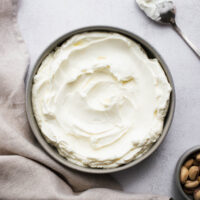
Labneh (or labne) is a Middle Eastern strained yoghurt cheese. It is a spreadable, creamy cheese with a tangy yoghurt flavour. Serve labneh as a mezze dish or dip, topped with olive oil and za'atar.
Servings8
Equipment
- Cheesecloth (muslin cloth)
- Mesh strainer – or sieve
Ingredients
- 3½ cups natural yoghurt *
- 1 teaspoon salt
- extra virgin olive oil , only necessary for extended storage
To serve (optional)
- 1 tablespoon za'atar
- ½ teaspoon sumac
- 2 tablespoons pistachio nuts , roughly chopped
- flaked salt
Instructions
- Mix the yoghurt and salt in a bowl.
- Line a sieve with cheesecloth (muslin cloth) or a clean tea towel. Place it over a large mixing bowl and spoon the salted yoghurt into the cloth-lined sieve. Cover the yoghurt by folding over the muslin or tying the ends together with string.
- Place a small weight on top of the covered yoghurt. I use a plate and a condiment jar from the fridge. The extra weight helps to squeeze out the whey.
- Put everything in the fridge and leave the liquid to strain off for 24 to 48 hours. The longer you strain it, the thicker the labneh.
- To store, place the labneh in a clean, sealable jar. It will keep for about two weeks in the fridge. Or, to preserve it for longer, cover the labneh with a layer of extra virgin olive oil. This way, it will last for months.
- To serve, spread the labneh in a serving bowl and create ridges with the back of a spoon. Add toppings and enjoy with toasted pita triangles or flatbreads.
Notes
- Use any full-fat natural yoghurt – Greek yoghurt works well. The choice of yoghurt will determine the flavour of the labneh. Use goat's milk yoghurt for a tangy cheese, stick to cow's milk yoghurt for a mild flavour, or combine the two types.
- Use plant-based yoghurt for vegan yoghurt cheese.
- If you don't have a fine mesh strainer or sieve, tie the muslin (cheesecloth or kitchen towel) together using string and hang the yoghurt-filled muslin ball over a bowl (or over the sink) to strain.